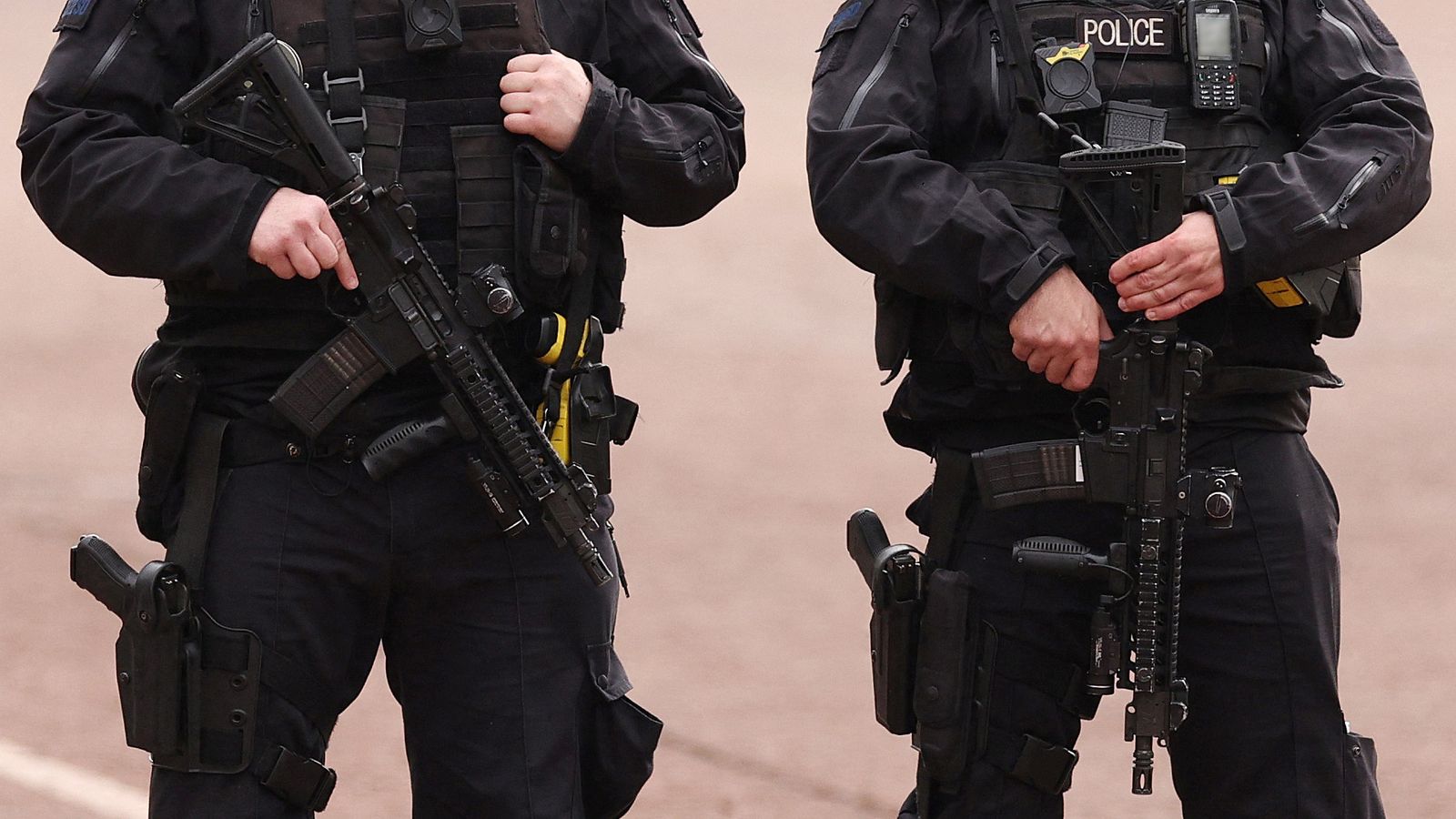The use of guns by police has come under renewed scrutiny after the decision to charge an officer with murder following the shooting of Chris Kaba.
The unnamed officer – referred to only as “NX121” – has appeared in court over the death of Mr Kaba in Streatham Hill, south London, in September last year.
The decision to charge the officer with murder has prompted some armed Met Police officers to revolt and stand down from firearms duties.
Here, Sky News looks at what happens to officers if they fire their guns – and what the Met wants to change.
What laws govern police and guns?
The use of “reasonable force”, including guns, by armed firearm officers (AFOs) is governed by various laws and guidelines.
Only a few are specifically for police officers – most apply to all members of the public, enabling them to defend themselves and others if there is a threat to life or to stop a crime being committed.
Use of ‘reasonable force’
Article 2, or the “right to life” clause, of the European Convention on Human Rights (EHCR) – which is enshrined in UK law by the Human Rights Act – is relevant here.
It gives anyone the right to act to protect life and means the state has to be investigated when it is thought to have failed to do so.
Similarly, Common Law gives everyone the right to self-defence and to use “reasonable force to protect themselves or another when necessary”.
If they’re about to be attacked, they don’t have to wait for their assailant to strike first, the law states, which means “police officers have the right to defend themselves from unlawful physical violence”.
The police must also “take appropriate action to protect others from harm”, it adds.
The Criminal Law Act is what justifies reasonable force in “the prevention of a crime, effecting or assisting in the lawful arrest of offenders or suspected offenders or other person unlawfully at large”.
But it’s section 117 of the Police and Criminal Evidence Act that specifically gives police officers the right to use reasonable force.
Rules for armed officers
The rules on police officers and guns are laid out in the Police Conduct Regulations 2020 for England and Wales.
In Scotland, the equivalent is the Police Service of Scotland Regulations 2014, while in Northern Ireland it’s the Police Service of Northern Ireland code of ethics.
They set out that officers should only discharge firearms to “prevent a real and immediate threat to life by shooting to stop the subject from carrying out their course of action”.
Usually this is done by shooting them in the torso. If it is “imperative the subject is immediately capacitated”, they are allowed to aim for the head.
This should only happen when “absolutely necessary in defence of a person when there is a real and immediate risk to life from unlawful violence”.
The number of shots fired “depends on the circumstances”, the regulations add, and the “use of excessive force is strictly prohibited”.
When shots are fired, the following points must also happen:
• Exercising restraint and acting in proportion to the seriousness of the offence being committed
• Minimising damage and injury where possible
• Ensuring medical aid is given at the earliest opportunity
• Reporting any death or serious injury to the officer’s superiors
• Punishing any “arbitrary” or “abusive” use of force by criminal law
• Not allowing public emergencies or internal political instability to be used as an excuse
Please use Chrome browser for a more accessible video player
What happens to officers if they fire their guns?
Each AFO is “individually responsible and accountable for their decisions and actions”, according to College of Policing.
When police use their guns and it results in serious injury or death, there is a relatively long process of accountability.
A mandatory referral is made to the Independent Office for Police Conduct (IOPC), which then carries out an investigation into the circumstances.
It can recommend a criminal investigation, which is prepared by the Crown Prosecution Service (CPS) before going to court.
The decision whether to launch misconduct or gross misconduct proceedings against the officer is referred back to the police force.
They will be suspended or put on restricted duties while they’re ongoing and can ultimately see them sacked or having their rank reduced.
Read more:
High-profile fatal police shootings in the UK
Will murder charge change way police shootings are reported?
If someone has died, an inquest will likely be opened. The coroner doesn’t launch criminal proceedings but can declare whether the person was unlawfully killed, which will result in a criminal case.
By contrast, AFOs have the right to refuse an order to use force or firearms and not face criminal or disciplinary proceedings.
If police chiefs are found to “know or should have known” their officers unlawfully used guns or force and didn’t act to stop them, they can also be investigated.
What does the Met commissioner want to change?
Met Police Commissioner Sir Mark Rowley has written to Home Secretary Suella Braverman in response to her launching a report into the police’s use of force.
In the letter, Sir Mark calls for “sufficient legal protection” for firearm officers to “do their job”.
He wants a review into “accountability mechanisms, including the practices of the Independent Office for Police Conduct and the Crown Prosecution Service”.
Specifically, he asks for changes to the “threshold for investigating police use of force and involvement with pursuits”.
He has also suggested changes to the definition of self-defence in police misconduct cases – and introducing a criminal standard of proof for inquests or public inquiries returning a finding of unlawful killing.
Sir Mark says that, under the current system, firearms officers can “face years of protracted legal proceedings” and be “investigated for safely pursuing suspects, just because the suspect acts recklessly and as a result injures themselves or someone else”.
Please use Chrome browser for a more accessible video player
What has the response been?
More than 100 Met officers reportedly handed in their permits allowing them to carry guns following the charge against NX121.
Former Met sergeant and policing commentator Graham Wettone says AFOs simply want “the legal protection they are entitled to” and to be treated “fairly and in a timely way”.
Former Met AFO Tony Long shot dead suspected drug dealer and robber Azelle Rodney in London in 2005. The case took 10 years to resolve and he was only acquitted of murder in 2015.
He told Sky News the “length of scrutiny” of AFOs who fire their guns is “unfair”.
Mr Long said they feel they have “no support whatsoever from Scotland Yard” and this results in years of them and their families being “seriously concerned about the implications of having to serve a prison sentence”.
By contrast, former Met Police superintendent Nusrit Mehtab said that AFOs want “immunity from prosecution”.
She said extending police protections is a “slippery slope” and pointed out findings in Baroness Casey’s report into the Met that AFOs have “some of the worst practices” in all the force.









